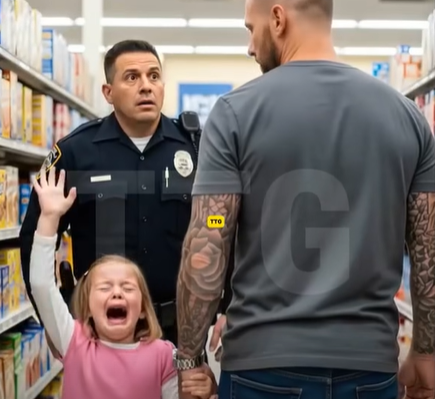Leather Jackets, Broken Chains, and a Child’s Last Wish: The Story of Katie and the Iron Wolves
Hospice staff at Saint Mary’s had witnessed many farewells, but nothing quite like what unfolded in Room 117.
Whispers spread fast—why were men in leather jackets, covered in tattoos, quietly taking shifts at the bedside of a dying seven-year-old girl?
Some feared trouble, others imagined darker motives. But behind that closed door was a truth no rumor could capture: a child abandoned by her own parents had found family in the most unexpected place—a motorcycle club that refused to let her face death alone.

Stories like Katie’s pierce through grief and transform it into something bigger than sorrow—proof that love can be louder than tragedy.
Katie, a frail seven-year-old with a bald head from chemotherapy, was abandoned at hospice when her overwhelmed parents relinquished custody. Alone and scared, she admitted to Big John, a biker visiting his own dying brother, “I’m not afraid of dying. I’m afraid of dying alone.”
That confession stirred something deep in John. He returned to his motorcycle club, the Iron Wolves, with a simple vow: Katie would never be alone again.
From that moment, the bikers took turns sitting with Katie around the clock. They read her stories, painted her nails black “to look tough,”
sang lullabies, and made her president of her own honorary biker club—Katie’s Wheels. They celebrated holidays early, decorated her room, and filled her last ninety-three days with laughter and belonging.
When the end came, forty bikers surrounded her bed. Big John held one hand; Rose, another. With a final squeeze, Katie slipped away—safe, loved, and never alone.
At her funeral, three hundred motorcycles roared in procession, escorting her small casket. Her biker vest was draped across her, a symbol of the family she chose and who chose her. Her headstone reads:
Katie ‘Little Warrior’ Johnson, 2016–2023. Never Rode Alone.
But Katie’s story didn’t end there. Inspired by her, the Iron Wolves launched Katie’s Vigil, a promise that no child in hospice will ever die without comfort again. Every year, they return to her grave to renew that pledge: love isn’t about blood—it’s about showing up.
Conclusion
Katie never owned a motorcycle, but she rode into the hearts of forty strangers who became her family. Her story reminds us all that compassion often comes from the most unlikely places—that even a child once left behind can inspire a legacy of love, presence, and community.
For the Iron Wolves, the ride didn’t stop when she died. Every mile they travel, every child they comfort, carries Katie’s spirit forward.
Katie’s final gift was more than family—it was a powerful message to the world: no one, no matter how small, should ever take their last breath alone.
What seemed like an ordinary trip to the grocery store quickly turned chilling. A young girl, pale and fearful, subtly raised her hand in an unusual way—an almost rehearsed gesture. To most, it might have gone unnoticed. But to one off-duty police officer browsing nearby, it was a silent alarm.
During a quick stop, the officer spotted a man gripping the girl’s wrist tightly. Without words, the girl lifted her hand, spreading her fingers and turning her palm outward—a signal the officer recognized from a human trafficking awareness seminar.
Acting immediately but discreetly, he called 911 and kept watch on the pair. Then, creating a distraction, he confronted the man, giving the girl the chance to break free. Backup arrived within minutes, and the suspect was arrested.
Thanks to the girl’s courage and the officer’s training, a potential tragedy was averted.
Conclusion
This incident is a powerful reminder of how knowledge and bravery can change the course of events. A single silent plea for help, met with quick and aware action, prevented a possible abduction. It shows that recognizing hidden signs can save lives—sometimes, one gesture is all it takes.
